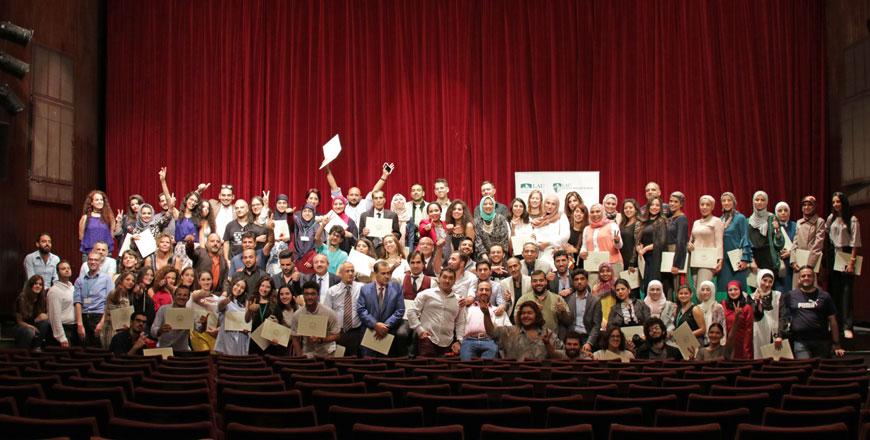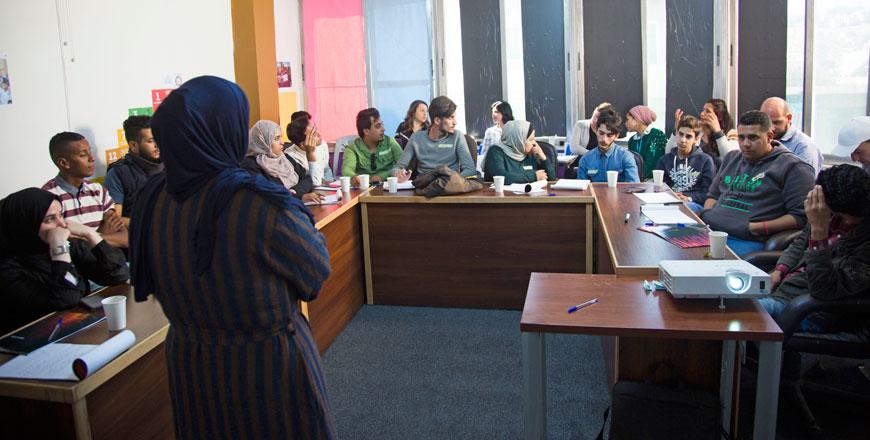You are here
Jordanian professionals return from media literacy training in Beirut
By Camille Dupire - Aug 26,2018 - Last updated at Aug 26,2018

Twelve Jordanians were part of a 70-participant group hailing from Iraq, Palestine, Egypt, Gambia, Syria, Germany and Bulgaria (Photo courtesy of Lynn EL Jbeily)
AMMAN — Twelve Jordanian professionals on Sunday returned to Jordan after undergoing a 12-day Media Information Literacy (MIL) training programme at the Lebanese American University in Beirut, as part of the EU-funded “Support to Media in Jordan” project.
“I believe in the necessity of media literacy which is not simply a luxury anymore. Here [at the training], I have developed my MIL skills and learned about international MIL experiences, and also enjoyed the technical training included in the programme,” said media counsellor and Ministry of Education spokesperson, Waleed Jallad.
Launched in 2014 by UNESCO with support of the EU, the “Support to Media in Jordan” project works to support Jordan’s efforts to increase media freedom, independence and professionalism, according to a UNESCO statement sent to The Jordan Times.
“MIL recognises the primary role of information and media in our everyday lives, empowering citizens to fully understand the functions of media and other information providers, critically evaluate content and make informed decisions,” the UNESCO statement said, stressing that “MIL has proven to be among the most effective responses to promoting tolerance, dialogue and peace, and countering hate speech and online polarisation”.
In line with these objectives, UNESCO and the EU sent 12 Jordanians to attend training at the sixth annual Media and Digital Literacy Academy of Beirut (MDLAB), hosted at the Institute of Media Research and Training at the Lebanese American University.
An academy established to promote the importance of media and digital literacy in the Arab world, MDLAB brings together academics, students, journalists and activists to learn, network and socialise on matters related to media and digital literacy, according to its website.
For Jallad, this training is a great boost to the “big plans” he has in mind. “We will now draft a comprehensive work plan and discuss it with decision makers at the MoE and UNESCO colleagues,” he commented.
Duaa Tobeiri, another trainee, and head of student services at Al Hussein Bin Talal University said: “The MDLAB programme aims at transferring the modern media information to raise the awareness of our students on the concepts of freedom of expression and critical thinking, so they will be able to produce media materials instead of only acting as consumers.”
“The programme has been wonderful; we have benefitted from the lectures and the technical workshops, which will help us to establish our MIL curriculum and transfer these experiences to students,” she added.
As part of their training, the participants attended lectures, workshops and panel discussions conducted by professionals in the field, which focused on fighting extremism through media, fake news, free media in the region, media for social justice and alternative media campaigns, among others, the UNESCO statement said.
For Reem Zoubi, from the faculty of education at the Al al-Bayt University, these 200 hours of training will be a great input as she starts teaching the MIL course in September.
“Teaching MIL will be a great challenge that I feel prepared for now and excited about,” she said, noting that the registration for her upcoming course is already “completely full”.
“The students are very eager to learn about MIL and I hope to be able to impart what I have learned. Some of the topics at MDLAB focused on gender and this subject is still taboo in some parts of Jordan. However, I feel that if we transfer what we have learned carefully, we will ensure that students are able to open their minds,” she continued.
This year, MDLAB hosted over 70 participants from countries including Jordan, Iraq, Palestine, Egypt, Gambia, Syria, Germany and Bulgaria. Regionally, MDLAB has successfully introduced media and digital literacy to 30 Arab universities as well as a handful of schools across some 12 Arab countries, according to its website.
Related Articles
AMMAN — As the world celebrated the Global Media Literacy Information (MIL) Week, the UNESCO Amman office, in collaboration with the Media D
AMMAN — An EU-funded media literacy project is equipping school students with the skills needed to access and analyse media content in a way
AMMAN — The UNESCO Amman office has recently launched a media training programme for youth, according to a joint statement sent to The Jorda


















